| Western blot (WB): | 1:500-2000 |
| Immunohistochemistry (IHC): | 1:50-400 |
| Immunocytochemistry/Immunofluorescence (ICC/IF): | 1:50-400 |
| ImmunoPrecipitation (IP): | 1:250-300 |
| Flow Cytometry (Fixed): | 1:50-200 |
| (Boiling the paraffin sections in 10mM citrate buffer,pH6.0,or PH8.0 EDTA repair liquid for 20 mins is required for the staining of formalin/paraffin sections.) Optimal working dilutions must be determined by end user. | |
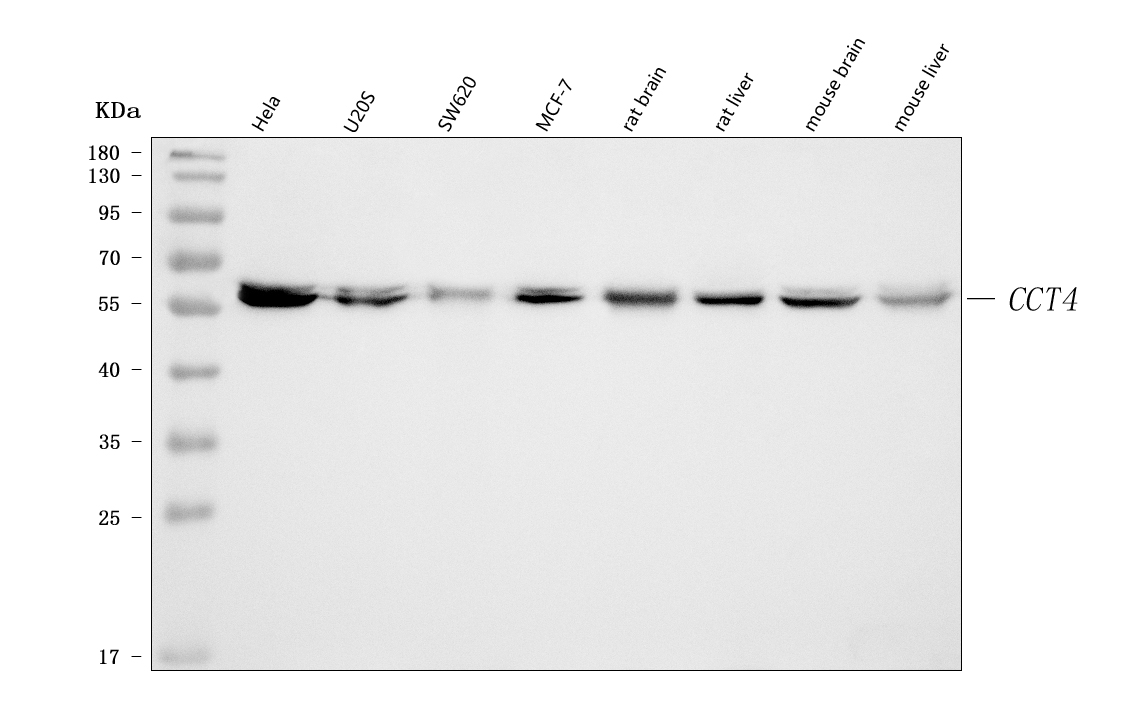
Western blot analysis of CCT4 using anti-CCT4 antibody (PB9927). The sample well of each lane was loaded with 30 ug of sample under reducing conditions.
Lane 1: human Hela whole cell lysates,
Lane 2: human U2OS whole cell lysates,
Lane 3: human SW620 whole cell lysates,
Lane 4: human MCF-7 whole cell lysates,
Lane 5: rat brain tissue lysates,
Lane 6: rat liver tissue lysates,
Lane 7: mouse brain tissue lysates,
Lane 8: mouse liver tissue lysates.
After electrophoresis, proteins were transferred to a membrane. Then the membrane was incubated with rabbit anti-CCT4 antigen affinity purified polyclonal antibody (PB9927) at a dilution of 1:1000 and probed with a goat anti-rabbit IgG-HRP secondary antibody (Catalog # BA1054). The signal is developed using ECL Plus Western Blotting Substrate (Catalog # AR1197). A specific band was detected for CCT4 at approximately 58 kDa. The expected band size for CCT4 is at 58 kDa.
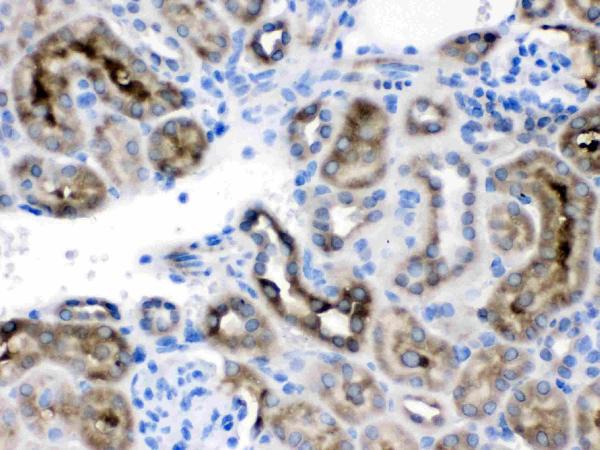
IHC analysis of CCT4 using anti-CCT4 antibody (PB9927).
CCT4 was detected in a paraffin-embedded section of mouse kidney tissue. Biotinylated goat anti-rabbit IgG was used as secondary antibody. The tissue section was incubated with rabbit anti-CCT4 Antibody (PB9927) at a dilution of 1:200 and developed using Strepavidin-Biotin-Complex (SABC) (Catalog # SA1022) with DAB (Catalog # AR1027) as the chromogen.
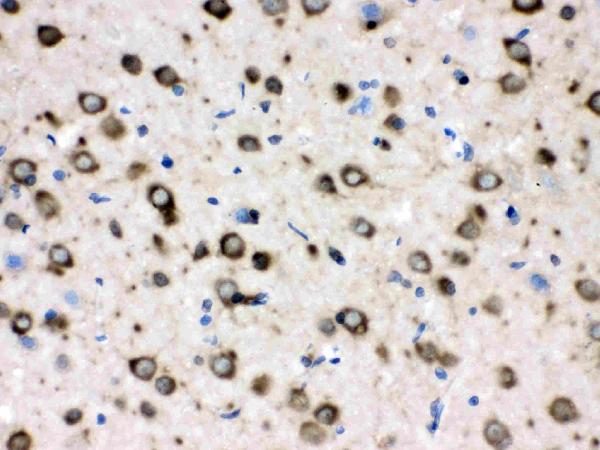
IHC analysis of CCT4 using anti-CCT4 antibody (PB9927).
CCT4 was detected in a paraffin-embedded section of rat kidney tissue. Biotinylated goat anti-rabbit IgG was used as secondary antibody. The tissue section was incubated with rabbit anti-CCT4 Antibody (PB9927) at a dilution of 1:200 and developed using Strepavidin-Biotin-Complex (SABC) (Catalog # SA1022) with DAB (Catalog # AR1027) as the chromogen.
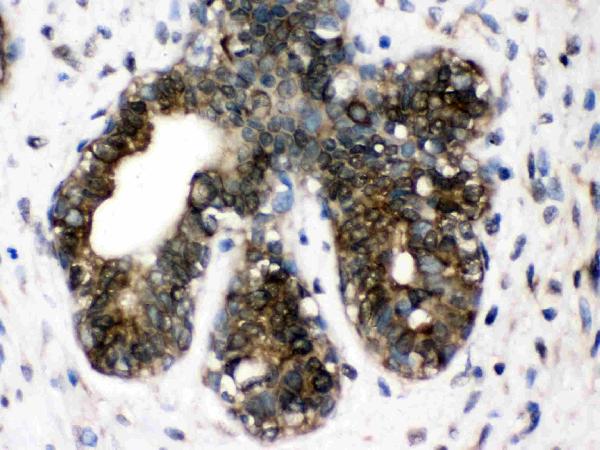
IHC analysis of CCT4 using anti-CCT4 antibody (PB9927).
CCT4 was detected in a paraffin-embedded section of human mammary cancer tissue. Biotinylated goat anti-rabbit IgG was used as secondary antibody. The tissue section was incubated with rabbit anti-CCT4 Antibody (PB9927) at a dilution of 1:200 and developed using Strepavidin-Biotin-Complex (SABC) (Catalog # SA1022) with DAB (Catalog # AR1027) as the chromogen.
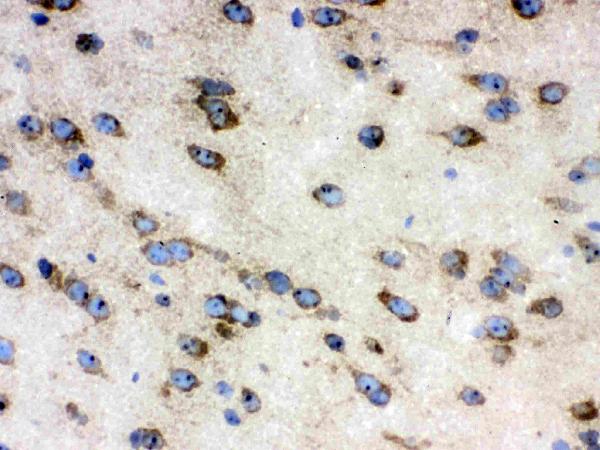
IHC analysis of CCT4 using anti-CCT4 antibody (PB9927).
CCT4 was detected in frozen section of mouse brain tissue. Biotinylated goat anti-rabbit IgG was used as secondary antibody. The tissue section was incubated with rabbit anti-CCT4 Antibody (PB9927) at a dilution of 1:200 and developed using Strepavidin-Biotin-Complex (SABC) (Catalog # SA1022) with DAB (Catalog # AR1027) as the chromogen.
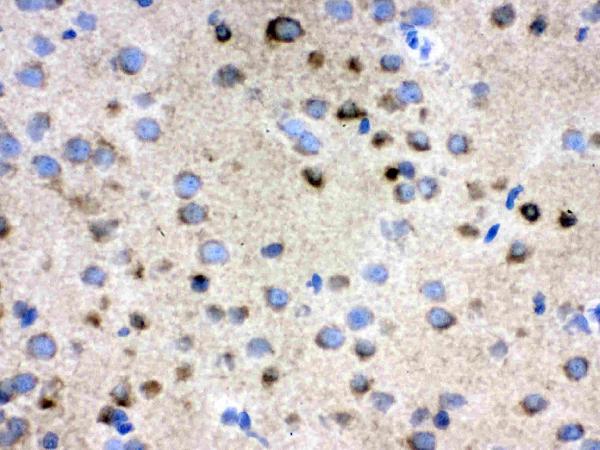
IHC analysis of CCT4 using anti-CCT4 antibody (PB9927).
CCT4 was detected in frozen section of rat brain tissue. Biotinylated goat anti-rabbit IgG was used as secondary antibody. The tissue section was incubated with rabbit anti-CCT4 Antibody (PB9927) at a dilution of 1:200 and developed using Strepavidin-Biotin-Complex (SABC) (Catalog # SA1022) with DAB (Catalog # AR1027) as the chromogen.
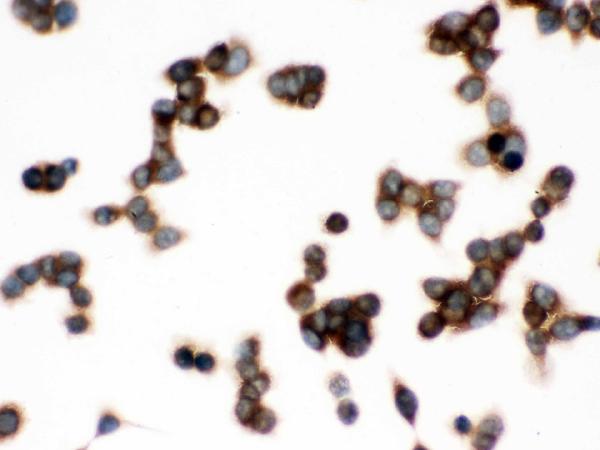
ICC analysis of CCT4 using anti- CCT4 antibody (PB9927).
CCT4 was detected in an immunocytochemical section of LOVO cells. The section was incubated with rabbit anti-CCT4 Antibody (PB9927) at a dilution of 1:100. Biotinylated goat anti-rabbit IgG was used as secondary antibody. The section was developed using Strepavidin-Biotin-Complex (SABC)(Catalog # SA1022) with DAB (Catalog # AR1027) as the chromogen.
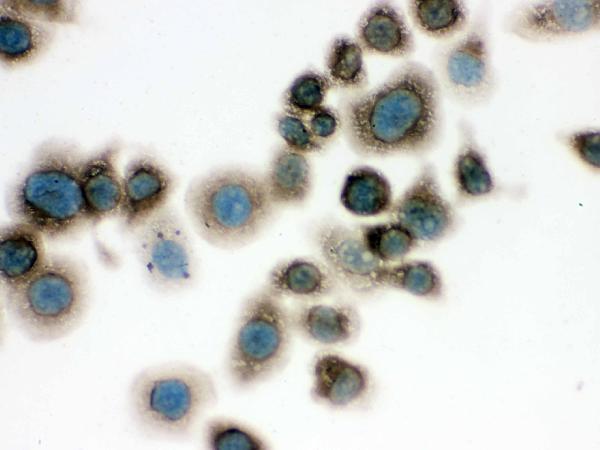
ICC analysis of CCT4 using anti- CCT4 antibody (PB9927).
CCT4 was detected in an immunocytochemical section of Neuro-2a cells. The section was incubated with rabbit anti-CCT4 Antibody (PB9927) at a dilution of 1:100. Biotinylated goat anti-rabbit IgG was used as secondary antibody. The section was developed using Strepavidin-Biotin-Complex (SABC)(Catalog # SA1022) with DAB (Catalog # AR1027) as the chromogen.
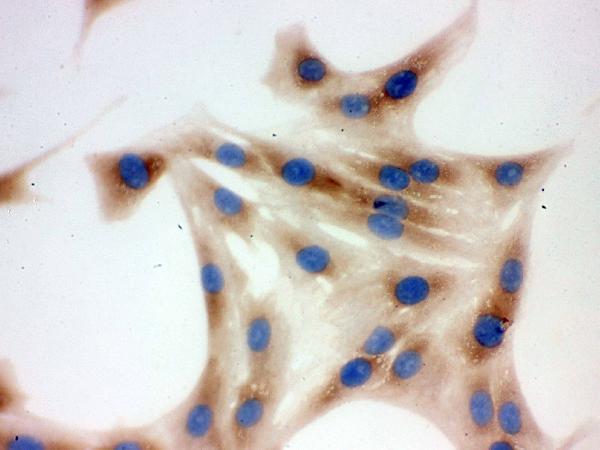
ICC analysis of CCT4 using anti- CCT4 antibody (PB9927).
CCT4 was detected in an immunocytochemical section of NRK cells. The section was incubated with rabbit anti-CCT4 Antibody (PB9927) at a dilution of 1:100. Biotinylated goat anti-rabbit IgG was used as secondary antibody. The section was developed using Strepavidin-Biotin-Complex (SABC)(Catalog # SA1022) with DAB (Catalog # AR1027) as the chromogen.
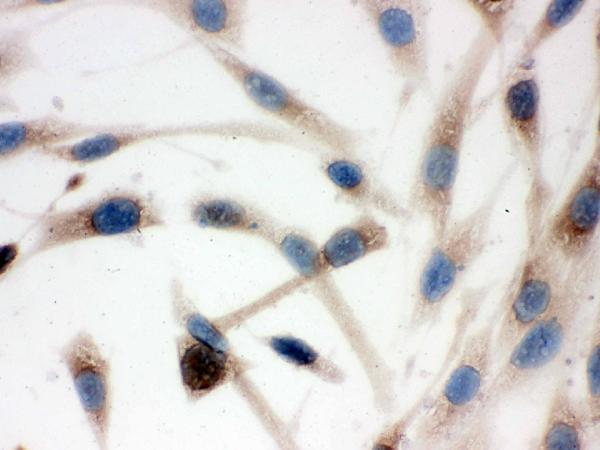
ICC analysis of CCT4 using anti- CCT4 antibody (PB9927).
CCT4 was detected in an immunocytochemical section of SHG-44 cells. The section was incubated with rabbit anti-CCT4 Antibody (PB9927) at a dilution of 1:100. Biotinylated goat anti-rabbit IgG was used as secondary antibody. The section was developed using Strepavidin-Biotin-Complex (SABC)(Catalog # SA1022) with DAB (Catalog # AR1027) as the chromogen.
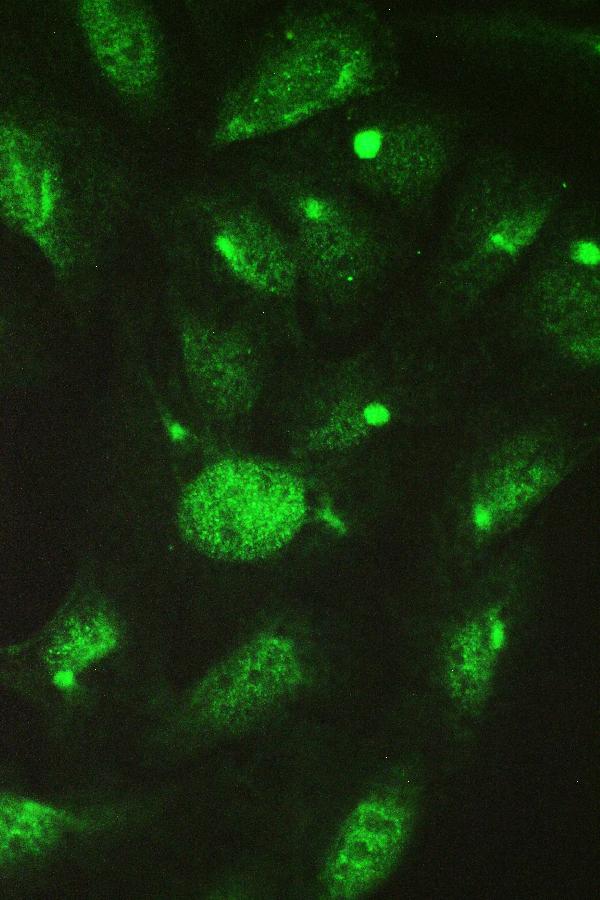
IF analysis of CCT4 using anti- CCT4 antibody (PB9927).
CCT4 was detected in immunocytochemical section of U2OS cell. Enzyme antigen retrieval was performed using IHC enzyme antigen retrieval reagent (AR0022) for 15 mins. The cells were blocked with 10% goat serum. And then incubated with 2μg/mL rabbit anti- CCT4 Antibody (PB9927) overnight at 4°C. DyLight®488 Conjugated Goat Anti-Rabbit IgG (BA1127) was used as secondary antibody at 1:100 dilution and incubated for 30 minutes at 37°C. Visualize using a fluorescence microscope and filter sets appropriate for the label used.
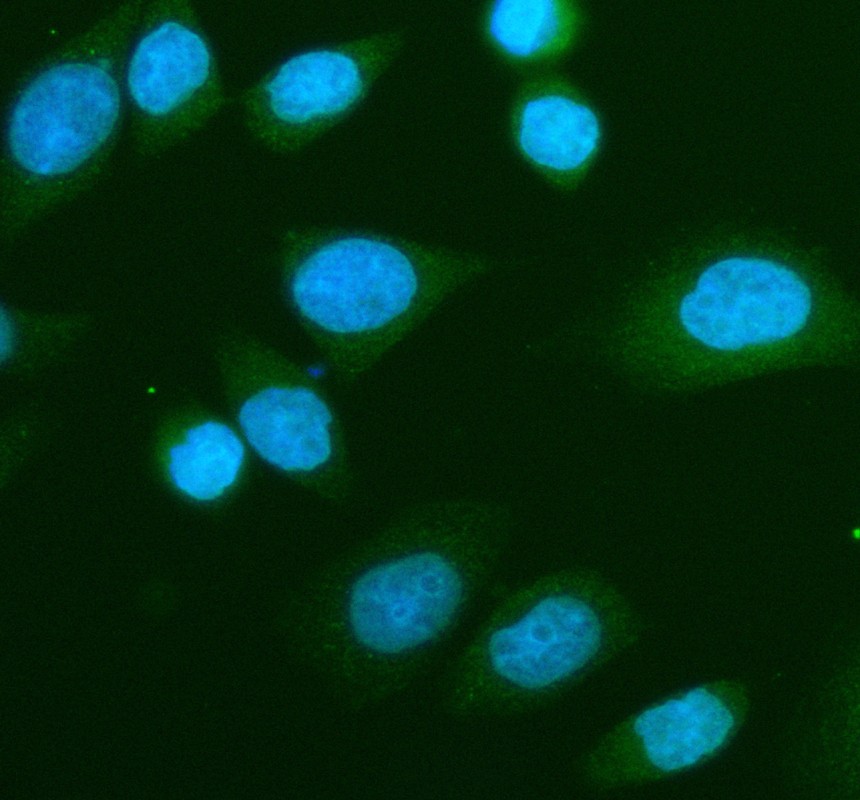
IF analysis of CCT4 using anti-CCT4 antibody (PB9927).
CCT4 was detected in an immunocytochemical section of SiHa cells. The section was incubated with rabbit anti-CCT4 Antibody (PB9927) at a dilution of 1:100. DyLight®488 Conjugated Goat Anti-Rabbit IgG (Green) (Catalog # BA1127) was used as secondary antibody. The section was counterstained with DAPI (Catalog # AR1176) (Blue).
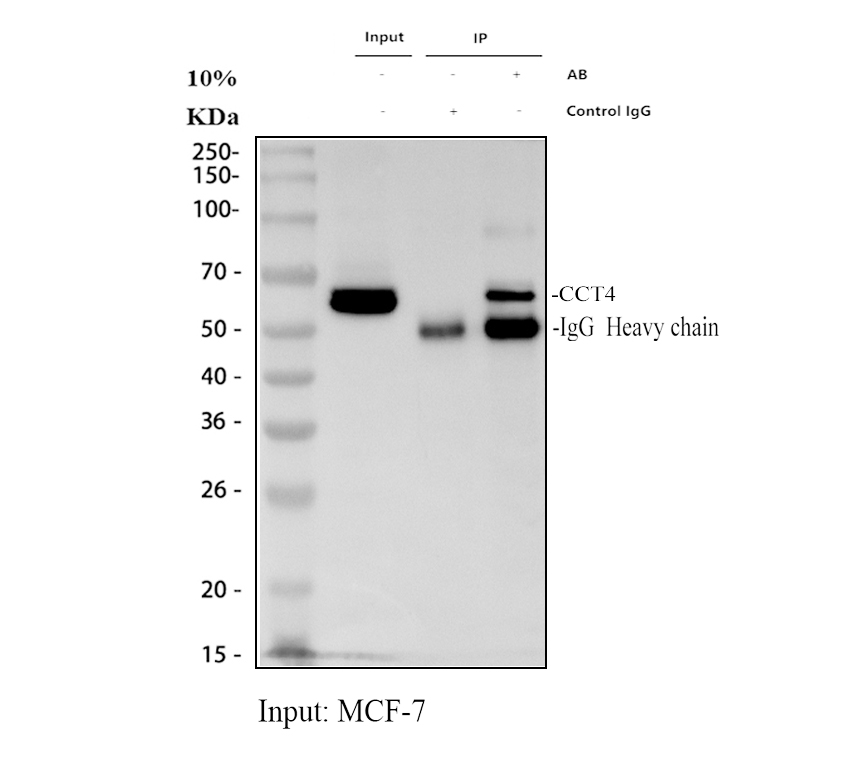
IP analysis of CCT4 using anti-CCT4 antibody (PB9927) in MCF-7 whole cell lysate.
Western blot analysis of CCT4 using anti- CCT4 antibody (PB9927).
Lane 1: MCF-7 whole cell lysates(30ug),
Lane 2: Rabbit control IgG instead of anti- CCT4 antibody in MCF-7 whole cell lysate,
Lane 3: anti- CCT4 antibody (2μg) + MCF-7 whole cell lysate (500μg).
After electrophoresis, proteins were transferred to a membrane. Then the membrane was incubated with rabbit anti- CCT4 antigen affinity purified polyclonal antibody (PB9927) at a dilution of 1:1000 and probed with a goat anti-rabbit IgG-HRP secondary antibody (Catalog # BA1054). The signal is developed using ECL Plus Western Blotting Substrate (Catalog # AR1197). A specific band was detected for CCT4 at approximately 58 kDa. The expected band size for CCT4 is at 58 kDa.
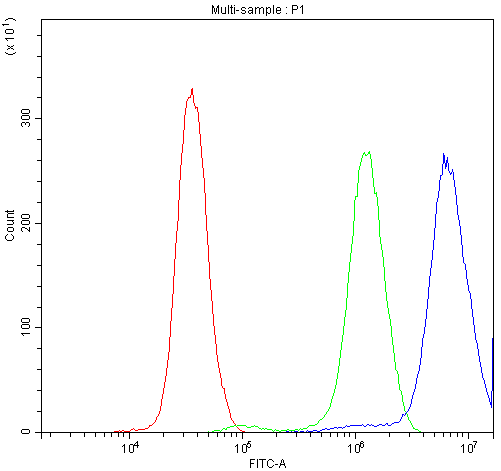
Flow Cytometry analysis of PC-3 cells using anti-CCT4 antibody (PB9927).
Overlay histogram showing PC-3 cells stained with PB9927 (Blue line). To facilitate intracellular staining, cells were fixed with 4% paraformaldehyde and permeabilized with permeabilization buffer. The cells were blocked with 10% normal goat serum. And then incubated with rabbit anti-CCT4 Antibody (PB9927) at 1:100 dilution for 30 min at 20°C. DyLight®488 conjugated goat anti-rabbit IgG (BA1127) was used as secondary antibody at 1:100 dilution for 30 minutes at 20°C. Isotype control antibody (Green line) was rabbit IgG at 1:100 dilution used under the same conditions. Unlabelled sample without incubation with primary antibody and secondary antibody (Red line) was used as a blank control.
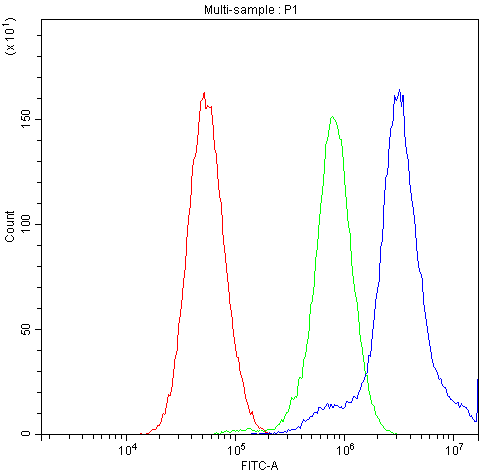
Flow Cytometry analysis of U251 cells using anti-CCT4 antibody (PB9927).
Overlay histogram showing U251 cells stained with PB9927 (Blue line). To facilitate intracellular staining, cells were fixed with 4% paraformaldehyde and permeabilized with permeabilization buffer. The cells were blocked with 10% normal goat serum. And then incubated with rabbit anti-CCT4 Antibody (PB9927) at 1:100 dilution for 30 min at 20°C. DyLight®488 conjugated goat anti-rabbit IgG (BA1127) was used as secondary antibody at 1:100 dilution for 30 minutes at 20°C. Isotype control antibody (Green line) was rabbit IgG at 1:100 dilution used under the same conditions. Unlabelled sample without incubation with primary antibody and secondary antibody (Red line) was used as a blank control.
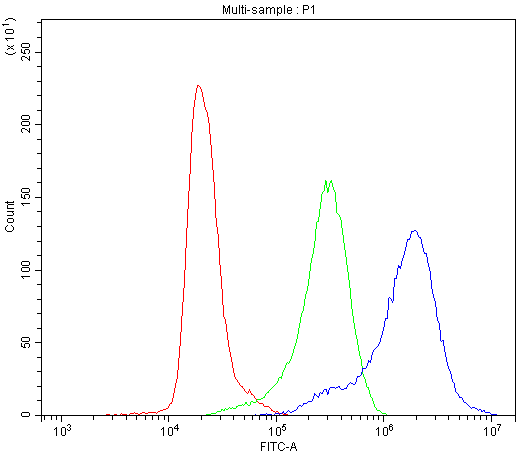
Flow Cytometry analysis of K562 cells using anti-CCT4 antibody (PB9927).
Overlay histogram showing K562 cells stained with PB9927 (Blue line). To facilitate intracellular staining, cells were fixed with 4% paraformaldehyde and permeabilized with permeabilization buffer. The cells were blocked with 10% normal goat serum. And then incubated with rabbit anti-CCT4 Antibody (PB9927) at 1:100 dilution for 30 min at 20°C. DyLight®488 conjugated goat anti-rabbit IgG (BA1127) was used as secondary antibody at 1:100 dilution for 30 minutes at 20°C. Isotype control antibody (Green line) was rabbit IgG at 1:100 dilution used under the same conditions. Unlabelled sample without incubation with primary antibody and secondary antibody (Red line) was used as a blank control.

Western blot analysis of CCT4 using anti-CCT4 antibody (PB9927). The sample well of each lane was loaded with 30 ug of sample under reducing conditions.
Lane 1: human Hela whole cell lysates,
Lane 2: human U2OS whole cell lysates,
Lane 3: human SW620 whole cell lysates,
Lane 4: human MCF-7 whole cell lysates,
Lane 5: rat brain tissue lysates,
Lane 6: rat liver tissue lysates,
Lane 7: mouse brain tissue lysates,
Lane 8: mouse liver tissue lysates.
After electrophoresis, proteins were transferred to a membrane. Then the membrane was incubated with rabbit anti-CCT4 antigen affinity purified polyclonal antibody (PB9927) at a dilution of 1:1000 and probed with a goat anti-rabbit IgG-HRP secondary antibody (Catalog # BA1054). The signal is developed using ECL Plus Western Blotting Substrate (Catalog # AR1197). A specific band was detected for CCT4 at approximately 58 kDa. The expected band size for CCT4 is at 58 kDa.

IHC analysis of CCT4 using anti-CCT4 antibody (PB9927).
CCT4 was detected in a paraffin-embedded section of mouse kidney tissue. Biotinylated goat anti-rabbit IgG was used as secondary antibody. The tissue section was incubated with rabbit anti-CCT4 Antibody (PB9927) at a dilution of 1:200 and developed using Strepavidin-Biotin-Complex (SABC) (Catalog # SA1022) with DAB (Catalog # AR1027) as the chromogen.

IHC analysis of CCT4 using anti-CCT4 antibody (PB9927).
CCT4 was detected in a paraffin-embedded section of rat kidney tissue. Biotinylated goat anti-rabbit IgG was used as secondary antibody. The tissue section was incubated with rabbit anti-CCT4 Antibody (PB9927) at a dilution of 1:200 and developed using Strepavidin-Biotin-Complex (SABC) (Catalog # SA1022) with DAB (Catalog # AR1027) as the chromogen.

IHC analysis of CCT4 using anti-CCT4 antibody (PB9927).
CCT4 was detected in a paraffin-embedded section of human mammary cancer tissue. Biotinylated goat anti-rabbit IgG was used as secondary antibody. The tissue section was incubated with rabbit anti-CCT4 Antibody (PB9927) at a dilution of 1:200 and developed using Strepavidin-Biotin-Complex (SABC) (Catalog # SA1022) with DAB (Catalog # AR1027) as the chromogen.

IHC analysis of CCT4 using anti-CCT4 antibody (PB9927).
CCT4 was detected in frozen section of mouse brain tissue. Biotinylated goat anti-rabbit IgG was used as secondary antibody. The tissue section was incubated with rabbit anti-CCT4 Antibody (PB9927) at a dilution of 1:200 and developed using Strepavidin-Biotin-Complex (SABC) (Catalog # SA1022) with DAB (Catalog # AR1027) as the chromogen.

IHC analysis of CCT4 using anti-CCT4 antibody (PB9927).
CCT4 was detected in frozen section of rat brain tissue. Biotinylated goat anti-rabbit IgG was used as secondary antibody. The tissue section was incubated with rabbit anti-CCT4 Antibody (PB9927) at a dilution of 1:200 and developed using Strepavidin-Biotin-Complex (SABC) (Catalog # SA1022) with DAB (Catalog # AR1027) as the chromogen.

ICC analysis of CCT4 using anti- CCT4 antibody (PB9927).
CCT4 was detected in an immunocytochemical section of LOVO cells. The section was incubated with rabbit anti-CCT4 Antibody (PB9927) at a dilution of 1:100. Biotinylated goat anti-rabbit IgG was used as secondary antibody. The section was developed using Strepavidin-Biotin-Complex (SABC)(Catalog # SA1022) with DAB (Catalog # AR1027) as the chromogen.

ICC analysis of CCT4 using anti- CCT4 antibody (PB9927).
CCT4 was detected in an immunocytochemical section of Neuro-2a cells. The section was incubated with rabbit anti-CCT4 Antibody (PB9927) at a dilution of 1:100. Biotinylated goat anti-rabbit IgG was used as secondary antibody. The section was developed using Strepavidin-Biotin-Complex (SABC)(Catalog # SA1022) with DAB (Catalog # AR1027) as the chromogen.

ICC analysis of CCT4 using anti- CCT4 antibody (PB9927).
CCT4 was detected in an immunocytochemical section of NRK cells. The section was incubated with rabbit anti-CCT4 Antibody (PB9927) at a dilution of 1:100. Biotinylated goat anti-rabbit IgG was used as secondary antibody. The section was developed using Strepavidin-Biotin-Complex (SABC)(Catalog # SA1022) with DAB (Catalog # AR1027) as the chromogen.

ICC analysis of CCT4 using anti- CCT4 antibody (PB9927).
CCT4 was detected in an immunocytochemical section of SHG-44 cells. The section was incubated with rabbit anti-CCT4 Antibody (PB9927) at a dilution of 1:100. Biotinylated goat anti-rabbit IgG was used as secondary antibody. The section was developed using Strepavidin-Biotin-Complex (SABC)(Catalog # SA1022) with DAB (Catalog # AR1027) as the chromogen.

IF analysis of CCT4 using anti- CCT4 antibody (PB9927).
CCT4 was detected in immunocytochemical section of U2OS cell. Enzyme antigen retrieval was performed using IHC enzyme antigen retrieval reagent (AR0022) for 15 mins. The cells were blocked with 10% goat serum. And then incubated with 2μg/mL rabbit anti- CCT4 Antibody (PB9927) overnight at 4°C. DyLight®488 Conjugated Goat Anti-Rabbit IgG (BA1127) was used as secondary antibody at 1:100 dilution and incubated for 30 minutes at 37°C. Visualize using a fluorescence microscope and filter sets appropriate for the label used.

IF analysis of CCT4 using anti-CCT4 antibody (PB9927).
CCT4 was detected in an immunocytochemical section of SiHa cells. The section was incubated with rabbit anti-CCT4 Antibody (PB9927) at a dilution of 1:100. DyLight®488 Conjugated Goat Anti-Rabbit IgG (Green) (Catalog # BA1127) was used as secondary antibody. The section was counterstained with DAPI (Catalog # AR1176) (Blue).

IP analysis of CCT4 using anti-CCT4 antibody (PB9927) in MCF-7 whole cell lysate.
Western blot analysis of CCT4 using anti- CCT4 antibody (PB9927).
Lane 1: MCF-7 whole cell lysates(30ug),
Lane 2: Rabbit control IgG instead of anti- CCT4 antibody in MCF-7 whole cell lysate,
Lane 3: anti- CCT4 antibody (2μg) + MCF-7 whole cell lysate (500μg).
After electrophoresis, proteins were transferred to a membrane. Then the membrane was incubated with rabbit anti- CCT4 antigen affinity purified polyclonal antibody (PB9927) at a dilution of 1:1000 and probed with a goat anti-rabbit IgG-HRP secondary antibody (Catalog # BA1054). The signal is developed using ECL Plus Western Blotting Substrate (Catalog # AR1197). A specific band was detected for CCT4 at approximately 58 kDa. The expected band size for CCT4 is at 58 kDa.

Flow Cytometry analysis of PC-3 cells using anti-CCT4 antibody (PB9927).
Overlay histogram showing PC-3 cells stained with PB9927 (Blue line). To facilitate intracellular staining, cells were fixed with 4% paraformaldehyde and permeabilized with permeabilization buffer. The cells were blocked with 10% normal goat serum. And then incubated with rabbit anti-CCT4 Antibody (PB9927) at 1:100 dilution for 30 min at 20°C. DyLight®488 conjugated goat anti-rabbit IgG (BA1127) was used as secondary antibody at 1:100 dilution for 30 minutes at 20°C. Isotype control antibody (Green line) was rabbit IgG at 1:100 dilution used under the same conditions. Unlabelled sample without incubation with primary antibody and secondary antibody (Red line) was used as a blank control.

Flow Cytometry analysis of U251 cells using anti-CCT4 antibody (PB9927).
Overlay histogram showing U251 cells stained with PB9927 (Blue line). To facilitate intracellular staining, cells were fixed with 4% paraformaldehyde and permeabilized with permeabilization buffer. The cells were blocked with 10% normal goat serum. And then incubated with rabbit anti-CCT4 Antibody (PB9927) at 1:100 dilution for 30 min at 20°C. DyLight®488 conjugated goat anti-rabbit IgG (BA1127) was used as secondary antibody at 1:100 dilution for 30 minutes at 20°C. Isotype control antibody (Green line) was rabbit IgG at 1:100 dilution used under the same conditions. Unlabelled sample without incubation with primary antibody and secondary antibody (Red line) was used as a blank control.

Flow Cytometry analysis of K562 cells using anti-CCT4 antibody (PB9927).
Overlay histogram showing K562 cells stained with PB9927 (Blue line). To facilitate intracellular staining, cells were fixed with 4% paraformaldehyde and permeabilized with permeabilization buffer. The cells were blocked with 10% normal goat serum. And then incubated with rabbit anti-CCT4 Antibody (PB9927) at 1:100 dilution for 30 min at 20°C. DyLight®488 conjugated goat anti-rabbit IgG (BA1127) was used as secondary antibody at 1:100 dilution for 30 minutes at 20°C. Isotype control antibody (Green line) was rabbit IgG at 1:100 dilution used under the same conditions. Unlabelled sample without incubation with primary antibody and secondary antibody (Red line) was used as a blank control.















